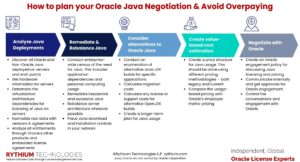This article will help you in taming the hidden costs of Java SE Licensing.
When managing Java SE Licensing you must be aware of the direct costs and potential hidden costs that can significantly impact your budget. These hidden costs can arise from various factors, including oversight in licensing third-party contractors and unexpected company growth.
What are the cost challenges with using Oracle Java?
The hidden costs of Java SE Licensing are most commonly:
- Oracle’s Employee Metric definition.
The definition includes- The internal employees of an organization and
- All external agents and contractors.
This definition is actually quite elastic and, as we have seen, it has been used to brow-beat customers into purchasing much larger number of licenses than actually used.
- Unplanned Growth in number of employees:
- Oracle might sell you a contract for a fixed period (between 3 to 7 or 8 years).
- This contract has a specific number of employees mentioned and licensed.
- Your total number of employees increases during the term of the contract
The increase in the number of employees later on leads to the need for making additional license payments to Oracle.
- Audit Penalties
- While most of the Java audits are soft audits, we are seeing an increasing number of deals where Oracle is insisting on getting paid for ‘past’ usage of Java.
- These penalties can range from 1 year to 3 years in the past.
Audit penalties have historically been used by Oracle to brow-beat customers into paying huge license fees. This continues with the sales process for Java SE licenses.
What should customers be doing?
- Conduct a license usage assessment immediately.
- Plan out strategies for
- Avoiding Oracle Java completely within your enterprise
- Using only pre-licensed or free Oracle Java
- Include Java SE licensing costs in your growth and expansion plans.
- Engage with Oracle with the analysed data and planned strategy.
Potential Savings
Across our engagement with more than 23 clients on Java license advisory, we have found that customers who follow the above process can save between 30% to 100% of their potential Java license exposure.
Rythium’s Java License Advisory Service
Rythium provides its Java License Advisory service to customers facing challenges with Java SE licensing. We have worked with a couple of dozen customers and helped them win against Oracle.
The scope of work includes:
Unveiling Your Java Footprint
The service begins with a thorough discovery of your Java deployments. We identify all instances, including Oracle Java, non-Oracle Java, and OpenJDK. This detailed inventory provides a clear picture of your current Java usage.
Expert Analysis and Strategic Guidance
Our team of licensing specialists then analyzes the discovered deployments in relation to your existing Oracle Java agreements and third-party entitlements. This process ensures accurate license classification and entitlement alignment.
Actionable Insights and Recommendations
Following the analysis, we provide a comprehensive report outlining your license requirements and potential areas for optimization. We offer recommendations for remediation and rebalancing your Java footprint, including strategic advice on Oracle deal structuring.
Negotiation Support and Advocacy
For clients navigating Oracle licensing discussions, we offer expert support. Our team assists with crafting communications, developing negotiation strategies, reviewing commercial offers, and participating in negotiations to secure the most favorable terms.
Key Benefits
- Reduced compliance risk: Gain peace of mind with a clear understanding of your Java licensing obligations.
- Cost optimization: Identify potential savings opportunities and achieve optimal license utilization.
- Improved efficiency: Streamline Java management with a comprehensive inventory and insightful recommendations.
- Expert guidance: Leverage the knowledge and experience of our seasoned licensing specialists.
You might want to read more about our CEO Sheshagiri Anegondi. He is one of the foremost Oracle license experts globally.
In case you want to understand the key issues to be considered in choosing between Oracle and non-Oracle Java, you can click here.



